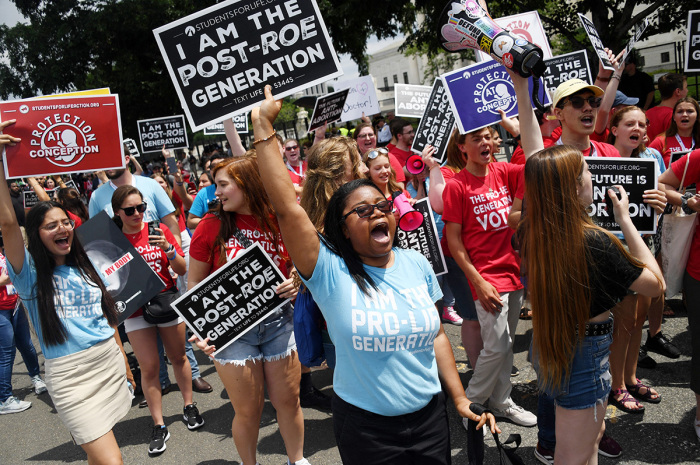'Misleading': CNN fact-checks Democratic ads attacking pro-life GOP candidates

CNN, generally considered a left-leaning news outlet, has labeled ads attacking four Republican candidates’ positions on abortion as “misleading.”
A fact-check posted Monday by Daniel Dale of CNN’s Washington Bureau analyzes the contents of ads spearheaded by Democrat-affiliated political action committees attacking four Republicans running for seats in the U.S. House of Representatives.
All four attack ads focused on abortion, which has gained renewed attention in American politics following the U.S. Supreme Court’s June 24 decision in Dobbs v. Jackson Women’s Health Organization.
The Dobbs decision, which determined that the U.S. Constitution does not contain a right to abortion, overturned the 1973 Roe v. Wade ruling that legalized abortion nationwide. Since then, many states have passed laws banning elective abortion. The Dobbs decision outraged Democrats and loomed large in each of the ads fact-checked by Dale.
The first example was an ad attacking Esther Joy King, the Republican candidate in Illinois’ 17th Congressional District. The ad claimed that King “stands with Republicans who want a national abortion ban with no exceptions for rape or incest.”
“While the ad from the Democratic Congressional Campaign Committee was correct that King describes herself as ‘unapologetically pro-life’ and that she praised the Supreme Court’s decision overturning Roe v. Wade, the ad didn’t mention that King said back in August that she supports exceptions for rape, incest and the life of the mother,” noted Dale.
“And at a debate the night before the ad was released, King also said she opposes a federal abortion ban,” Dale added.
King’s campaign sent a letter to television stations asking them to stop airing the ad, describing it as a “smear” that is “purposefully distorting” her position.
Dale also fact-checked an ad claiming that Marc Molinaro, who is running in New York’s 19th Congressional District, would “stand with politicians who support a nationwide ban on abortion.”
“Molinaro describes himself as ‘personally pro-life’ and generally opposes abortion after 17 weeks. But he said in an August debate that he would not support a nationwide ban,” Dale reported.
The fact-check featured another ad from the DCCC, released in mid-September, which claimed that Nevada’s 3rd Congressional District’s Republican candidate April Becker wants “to join the Republicans in Congress trying to ban abortion nationwide, including Nevada.”
“While Becker obviously wants to be part of the Republican caucus in Congress, the ad did not mention that she has repeatedly pledged to vote against any federal abortion ban,” Dale noted.
Finally, the fact-check critiqued a House Majority PAC ad released in late September that claimed that George Logan, who is running in Connecticut’s 5th Congressional District, would support “a nationwide ban on abortion, including in Connecticut.”
“The ad didn’t mention that Logan himself has repeatedly expressed support for abortion rights and opposition to a national abortion ban,” Dale noted.
“More than a week prior to the release of the ad, the CT Mirror reported that Logan said: ‘I don’t support a national ban. I believe it should be up to the states. Right here in Connecticut, we have codified a woman’s right to choose. That’s what I support.’”
According to his official CNN profile, Dale is credited with being “the first journalist to fact-check every false statement from President Donald Trump.”
Advocacy groups on both sides of the abortion debate are invested heavily in ensuring that their supported candidates emerge victorious in next month’s election. The pro-life group Susan B. Anthony Pro-Life America expects to spend approximately $78 million during the 2022 midterm election cycle, in the hopes of reaching over 8 million eligible voters to vote for anti-abortion candidates.
SBA Pro-Life America Communications Director Mary Owens told The Christian Post in an interview last month that her organization has “boots on the ground” in battleground states to “educate voters on the life issue and expose the Democrats’ pro-abortion extremism.”
Meanwhile, the political arm of abortion giant Planned Parenthood is expected to spend $50 million during the midterm election cycle to advance pro-choice candidates, breaking their previous spending record of around $45 million during the 2020 election.
“Who wins in these midterm elections will determine whether a state has access to abortion and potentially determine whether we will face a national abortion ban,” said Jenny Lawson, the executive director of Planned Parenthood Votes, to The Associated Press.
“We will be clear about who is on which side.”
Despite these efforts, some polls indicate that the abortion debate will be low on voters’ minds come November, with issues like inflation, the economy and education taking higher priority.
In July, the Harvard Center for American Political Studies and the Harris Poll released a survey indicating that the overturning of Roe would have little impact on the midterms.
According to the report, while 36% of respondents said that the Supreme Court decision made them more likely to vote Democrat, another 36% said the ruling made them more likely to vote Republican.
When a New York Times/Siena College poll from earlier this month asked likely voters what they considered “the MOST important problem facing the country today,” 5% responded with abortion.
According to the NYT/Siena survey, 26% of respondents said the “most important problem” is the economy, 18% said inflation and 8% said the “state of democracy.”
With three weeks to go until the midterm elections determining which party will control the U.S. Congress for the next two years, the RealClearPolitics average of generic ballot polls asking voters which party they want to control Congress shows Republicans with a 2.2-point lead over Democrats.
The FiveThirtyEight Deluxe Model, which forecasts the outcome of elections based on “polls, fundraising, past voting patterns” and the opinions of political experts, gives Republicans a 73% chance of retaking control of the House. Meanwhile, the model gives Democrats a 62% chance of holding onto the U.S. Senate.





























